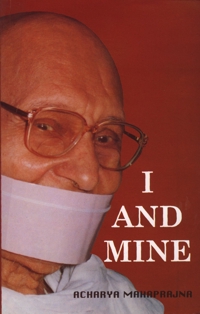
The word Sahanubhuti (sympathy) is made up of three parts - Sah, Ami, and Bhuti. Bhuti means 'to be', i.e., existence.
I am, this is my existence, my personality. In spirituality there is individualism, in it the individual simply is or exists. ‘ I am' indicates pure existence.
‘I am so and so' indicates social existence. ‘I am scholarly,' ‘I am wealthy', 'I am religious' - in these statements an adjective is used to qualify ‘I' and as soon as it is done we move from the world of Bhuti (to be) into the world of Anubhuti (experience or sensibility).
I often used to think which line divided man and society. Now I know that it is Bhuti (to be). On one side of it is the individual, on the other is society. Joining gives the meaning of Bhuti, to be at the back of something. Anubhuti is not independent. It has no independent existence whether it is sensory or mental.
The independence of our social life is relative. Sensory and mental world cannot be altogether absolute. There are various limits to freedom. Independence can exist only where there is only action and no reaction. One of the children throws a lump of earth at another. The second child throws it back at the first. This is reaction to the original action. Now the question arises as to whether the throwing of the lump by the first child is not an action. It is not - it is also a reaction. No action is ever possible without Bhuti (being or existence). Every action is bound to genetic traits and memory. It does not make sense that any action either motivated by or hindered by memory can ever be independent.
Reaction means the restriction of personality. In the social world what happens is not action but reaction. Experience or sensibility is sociality. One more word sah (with, together) added and then it becomes pure sociality. For example, Sah-shiksha (co-education), Sah-chintan (thinking together), Sah-bhojan (eating together), etc. Sympathy is an important social quality. Where Anubhuti (sensibility or feeling) is not sah (together), selfishness gets an opportunity to grow.
Exploitation takes place in the absence of sympathy. If somebody is endowed with sympathy, he can never exploit others. One who is conscious as much of other's existence as of one's own can never exploit or be unjust to others. The growth in cruelty can be directly attributed to the indifference to sympathy. With sympathy in one's life cruelty can never grow. Too much concentration on oneself gives rise to cruelty and non-violence and compassion takes a back seat. Selfishness is nursed in the absence of sympathy. Conflict, perplexity etc. also prosper in the absence of sympathy. There is inconsistency in accepting sociality and rejecting sympathy.
Shuddhopayoga is the state of individuality even amidst social living. In it there is nothing beyond the state of being of existence. It is a process of ridding oneself of mental afflictions. Samya Yoga, China Nirodh, Dhyan or Shuddopayoga is a state where consciousness is not tagged on to any external object or sensual pleasure. Mental affliction is caused when Shuddopayoga is combined with external objects.
'I am happy' is not indicative of Shuddopayoga. The concept 'happiness' when combined with me relegates my being to a secondary position. Happiness is not natural; it is dependent on or relative to appearances.
‘I am unhappy' - this is the experience of an affliction. There is a state of spontaneous joy - beyond the ordinary states of happiness, unhappiness, and mental affliction - and that is Shuddopayoga.
If we had been imbued with the state of Shuddopayoga, we would not have needed sympathy at all. My sensibility would not have been related to or resulting from another object. But we live on the basis of experiences and so are not free from being related or sequent to others. No matter who and what they are - sadhus, ascetics, or businessmen, or people attached to activity or detached from it - they cannot disconnect themselves from the question of sociality.
So long as we are associated with body, mind and speech, it is not possible for us to disregard the importance of sympathy. The governing principle of sympathy is that we should use our external freedom consistent with the freedom of others.
If we treat Dada Dharmadhikari as a guest, his freedom will be hindered and we too shall be burdened with constraint. We are human beings; he too is a human being. Between us, therefore, there is a direct relationship. Neither are we hampered by his system, nor is he hampered by our system. For freedom all that man needs is to be man. As one man to another man people should be directly related to each other.
Present day relation is not of the above type, one man needs money while another has the ability to give away money. This is a relation of the giver and the non-giver. Similarly, there are innumerable relations like that of the master and the servant, protector and the protected etc.
 Acharya Mahaprajna
Acharya Mahaprajna




